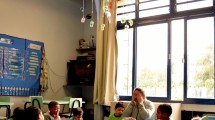Abstract
This paper reports part of a study which investigated young children's conceptions of scientific and technological phenomena and the conceptual change that occurs during the teaching of science in pre-school, Transition/Year One and Year Two/Three classrooms. Science lessons from each school/centre were audio and video taped for a period of six months. Informal interviewing of teachers occurred in direct response to lessons observed. Informal interviewing of children was conducted to determine current scientific thinking in relation to the science lessons presented by the teacher.
Two main elements emerged. First, different types of teacher-child interactions were evident during the science lessons observed and it was found that specifically focused interactions led to conceptual development in young children. Second, children's views (whether scientific or not) were maintained over a three month period.
Similar content being viewed by others
References
Baird, J. R. & Mitchell, J. (1986) (Eds)Improving the quality of teaching and learning: an Australian case study — the Peel project. Melbourne, Monash University Printery.
Biddulph, F. & Osborne, R. (1984) (Eds)Making sense of our world; an interactive teaching approach. Science Education Research Unit, University of Waikato, Hamilton, N.Z.
Carey, S. (1986) Cognitive science and science education.American Psychologist, 41 (10), 1123–1130.
Champagne, A. B., Gunstone, R. F. & Klopfer, L. E. (1983) Naive knowledge and science learning.Research in Science and Technology Education, 1 (2), 173–183.
Cosgrove, M., Osborne, R, & Carr, M. (1985) Children's intuitive ideas on electric current and the modification of those ideas. In R. Duit, W. Jung, & C. von Rhoneck, (Eds)Aspects of understanding electricity. Proceedings of an international workshop, Kiel West Germany, Ludwigsburn September, 10–14, 1984.
Driver, R. (1983)The Pupil as a scientist? Milton Keynes, Open University Press.
Driver, R. (1988) Theory into practice II: a constructivist approach to curriculum development. In P Fensham, (Ed)Development and dilemmas in science education. London, The Falmer Press.
Duit, R., Jung, W., & von Rhoneck, C. (1985). (Eds)Aspects of understanding electricity. Proceedings of an international workshop, Kiel West Germany, Ludwigsburn September, 10–14, 1984.
Fensham, P. J. (1988). Familiar but different: some dilemmas and new directions in science educatio. In P. Fensham, (Ed)Development and Dilemmas in Science Education. London, The Falmer Press.
Gauld, C. F. (1988). The cognitive context of pupils' alternative frameworks.International Journal of Science Education, 10 (3), 267–274.
Gunstone, R. F. (1988). Learners in science education. In P. Fensham, (Ed)Development and dilemmas in science education. London, The Falmer Press.
Osborne, R. J. (1985) Building on children's intuitive ideas, In R. J. Osborne, & P. Freyberg, (Eds)Learning in science.The implications of children's science. Auckland, Heinemann.
Osborne, R. J. & Freyberg, P. (1985) (Eds)Learning in science.The implications of children's science. Auckland, Heinemann.
Osborne, R. J. & Wittrock, M. C. (1985). The generative learning model.Studies in Science Education, 12, 59–87.
Pines, A. L. & West, L. H. T. (1985) Eds).Cognitive structure and conceptual change. N.Y., Academic Press.
Schollum, B. & Osborne, R. (1985). Relating the new to the familiar. In R. J. Osborne, & P. Freyberg.Learning in science. The implications of children's science. Auckland, Heinemann.
Symington, D. J. & Hayes, D. (1989). What do you need to know to teach science in the primary school?Research in Science Education.19, 278–285.
Author information
Authors and Affiliations
Rights and permissions
About this article
Cite this article
Fleer, M., Beasley, W. A study of conceptual development in early childhood. Research in Science Education 21, 104–112 (1991). https://doi.org/10.1007/BF02360463
Issue Date:
DOI: https://doi.org/10.1007/BF02360463




